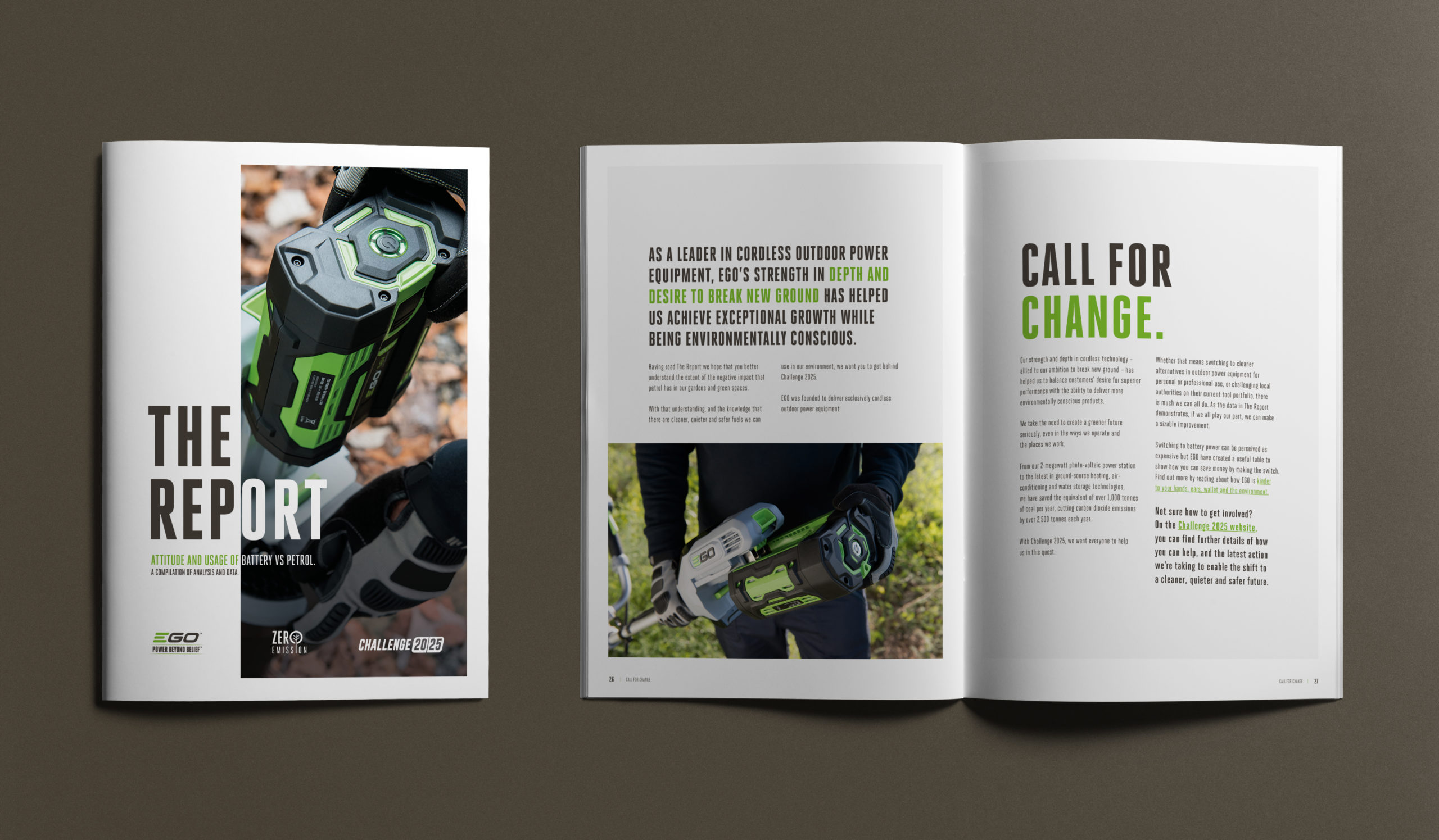The Evidence
Here at Challenge 2025, we like to deal with the facts. Whether its new research conducted by trusted sources, or our own, we’re always gathering evidence that can help gardeners and professional users of power tools to make an informed choice on the choice of fuel they choose to use, and in the hope that we can empower them to make a change to sustainable alternatives like battery power.
Emissions

When it comes to emissions, councils nationwide are tackling the issue with the introduction of policies such as Ultra Low Emissions Zones (ULEZ). ULEZ’s prohibit vehicles that emit a certain level of carbon from entering them, with the goal of cleaning up our inner-city air. But what many fail to recognise is that harmful emissions aren’t exclusive to transport and energy production, but there are other culprits, such as petrol-powered gardening tools.
Challenge 2025’s research piece, The Report, found that 89% of UK council tools are petrol powered, using 600,000 litres of fuel each year. The emissions of the most widely used power tool, a leaf blower, exceeds that of a small car – an eye-opening statistic.
Some key statistics around emissions that we found in The Report are:
- 11x more CO is emitted by a petrol-powered leaf blower compared to a Ford Fiesta
- 4x more NOx is emitted by a petrol brush cutter than a Ford Fiesta
- 60% of respondents think pollution could be reduced if everybody switched to electric garden power tools
- 89% of council tools are petrol powered
- 74% admit they believe battery offers better value for money and easier usage than petrol
Statistics are of 1,255 people surveyed*
The Report

The UK’s most popular petrol-powered outdoor power tools were put to the test, as part of a report published by EGO in 2020. Bringing together evidence, insight and expert opinion, The Report uncovers the true environmental impact of petrol-powered tools – and outlines consumer attitudes when it comes to tackling climate change.
When subject to emissions tests, petrol-powered tools are proven to use significant levels of petrol compared to the average car and in some cases even exceed permitted levels of particulates – which is startling as these tools are not subject to the same standards and testing as road going vehicles.
Knowing how damaging these tools can be in terms of pollution, it’s worrying that they remain in the hands of unassuming users and are still used to maintain outside space. Using the evidence found in The Report want to make people aware of the dangers of petrol-powered tools, not just on our environment, but also on the health of ourselves and our communities.
To gather the comprehensive results for The Report, we commissioned emissions and fuel economy tests, carried out a survey of domestic and professional power tool users and submitted Freedom of Information requests to analyse data from councils across the UK.
Download The Report
Noise and Vibration
Whilst a silent killer of our environment can be attributed to the carbon emissions of petrol-powered tools, the not-so-quiet problem is the noise pollution that they emit. It has slowly become common background noise to those living in populated areas, but it doesn’t mean that noise pollution is harmless. Noise pollution has been linked to various health conditions such as: Tinnitus, high blood pressure, heart disease and can cause a strain on mental health.
The health impact of excessive exposure to vibration is also very real. Those exposed can experience loss of hand strength, which can impact your ability to perform everyday tasks and impact your quality of life. Another condition linked to excessive vibration is Vibration White Finger (VBW). VBW can cause permanent loss of feeling or tingling in the hands and arms.
For landscaping professionals or even just home gardeners, daily exposure to excessive levels of sound and vibrations are unavoidable with petrol powered gardening tools, but to battery powered gardening tools, can reduce the impact on both yourself and the environment around you.
Our Test with Earlsmere
EGO commissioned Earlesmere, a leading on-site noise and vibration testing company to test their range of battery powered gardening equipment against leading petrol powered competitors to see which emitted a higher noise (decibels) and vibrational output (m/s2) in real-life scenarios.
As part of the test, 5 different categories of tools, with one tool of petrol and battery power in each category being put to the test: rotary mowers, hedge trimmers, line trimmers, leaf blowers and chainsaws.
Noise
| Product | Petrol | Battery |
| Leaf Blower | 91.80 dB(A) | 84.20 db(A) |
| Mower | 80.10 dB(A) | 74.70 dB(A) |
| Chainsaw | 102.30 dB(A) | 94.00 dB(A) |
| Hedge Trimmer | 95.10 dB(A) | 84.30 dB(A) |
| Strimmer | 103.80 dB(A) | 88.00 dB(A) |
Vibration
| Product | Petrol | Battery |
| Leaf Blower | 1.78 m/s2 | 1.00 m/s2 |
| Mower | 3.27 m/s2 | 2.00 m/s2 |
| Line Trimmer | 3.07 m/s2 | 1.17 m/s2 |
When measuring noise, we follow the 3 Decibel Rule, in which the doubling of an object is equal to a 3dB increase. For example, if one concert is measured at 100dB, then two concerts would be 103dB.
Following the 3dB rule, we can see that the decibel count of a single petrol-powered strimmer is equal to that of two music concerts, with a chainsaw following closely behind. It was found that every battery powered tool has a lower noise output than petrol power, meaning that battery power has much less of an impact on users and people nearby.
In the UK and EU, regulations exist for the level of hand arm vibration that an employee can be exposed to in a day, with the maximum being 5m/s2. 3 out of 5 battery powered tools were measured as having a lower vibrational output than the limit, showing that EGO’s tools are moving in the right direction in terms of safety.
To keep up to date on our findings, visit our blog and sign up for our newsletter below.